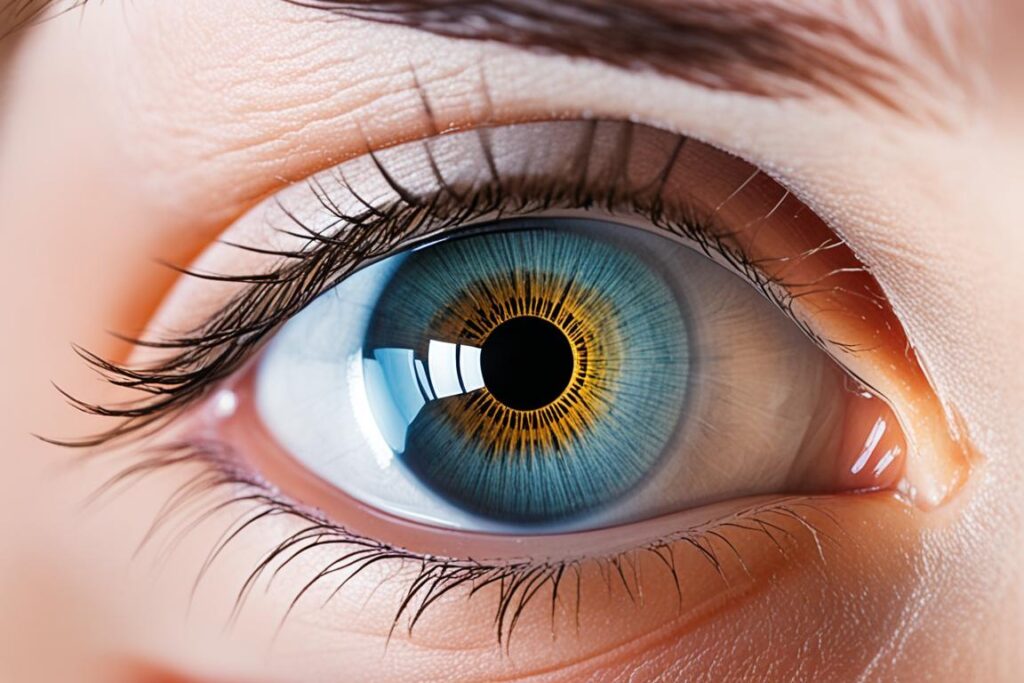Extended wear contact lenses let you see clearly without daily maintenance. They work day and night, providing clear vision when you wake up. Let’s look at their benefits and possible issues.
These lenses are great for people always on the move or who don’t like touching their eyes. They save time because you don’t have to clean and remove them daily. This convenience is one of their key selling points.
They can also save you money over time because you don’t have to buy contacts as often. For those needing vision correction long-term, this is a significant advantage.
But, there are risks you need to think about with these lenses. One big worry is the higher chance of getting an eye infection. Wearing them for long periods can make it easier for bacteria to grow on the lenses.
They also might not let enough oxygen and tears through to your eyes. This can lead to irritation and infections, like ulcerative keratitis. People might be more likely to get these problems with extended wear lenses than with daily ones.
Key Takeaways:
- Extended wear contacts offer convenience and continuous vision correction.
- They can be cost-effective compared to daily wear contacts.
- Risks include an increased chance of eye infections and reduced oxygen and tear flow.
- Warning signs of trouble include eye discomfort, redness, vision changes, and watery eyes.
- Regular consultation with a doctor is crucial to monitor eye health and address any potential issues.
What Are the Risks of Extended Wear Contacts?
Extended wear contacts let you see clearly without taking out your lenses daily. Yet, they comes with some risks. The main danger is a higher chance of getting eye infections, such as ulcerative keratitis.
Wearing these contacts all the time can cause less oxygen and tears to reach your eyes. This situation is perfect for bacteria to grow, leading to infections. People who use extended wear contacts are more likely to get ulcerative keratitis.
Putting in contacts and then sleeping increases infection risks. Your eyes don’t make as many tears, leaving dirt and bacteria. This increases the chance of getting an eye infection.
Keep an eye out for warning signs while wearing them. If your eyes feel uncomfortable, look red, or change how you see, take the contacts out. Then, see an eye doctor. Doing this quickly might stop a severe infection.
“The reduced oxygen supply to the cornea can create an environment where bacteria can thrive, increasing the risk of infections.”
The dangers of using extended wear contacts change from person to person. This depends on the type of lens, how you use them, and your eye health. Some might be more at risk because of their health or life habits.
Although they are easy to use, taking care of your eyes is more important. It’s vital to use them wisely to avoid infections and other problems.
Next, we’ll look at using extended wear contacts for people with astigmatism. We’ll talk about the choices available.
Extended Wear Contacts & Astigmatism
Extended wear contacts are a game-changer for those with astigmatism. This eye condition can make finding the right vision correction tough. But, these contacts have been designed to meet this specific need.
The toric lens is a great option for astigmatism. It’s weighted in key areas to sit well on the eye. This means it stays put even when you blink. Thus, it provides clear and comfortable vision.
For a different kind of correction, there are gas permeable lenses. Also called RGP lenses, they’re solid and shape-friendly. The unique design allows for sharp vision in people with astigmatism.
Hybrid lenses offer yet another choice. They mix the benefits of both toric and gas permeable lenses. The RGP center corrects astigmatism while the soft outer parts boost comfort.
Contact lens makers understand the need for varied products for astigmatism. They’ve developed toric lenses, gas permeable lenses, and hybrids. So now, managing astigmatism with contacts is more accessible than ever.
Buy Toric Lenses from Lenses.com, gas permeable Lense from Just Lenses, Hybrid lenses from Gaddie Eyes
Benefits of Extended Wear Contacts for Astigmatism:
- Continuous vision correction throughout the day and night
- Comfortable fit despite eye movement and blinks
- Sharp and precise vision for those with astigmatism
- Fewer lens insertions and removals compared to daily wear contacts
Check out the image below to see the different types of extended wear contacts available for astigmatism:
Thanks to special extended wear contacts, those with astigmatism have more choices. They don’t have to stick only to glasses or consider surgeries. These lenses offer convenience and better vision without the hassles.
Are Extended Wear Contacts Right for Everyone?
Extended wear contacts sound great for many people. They let you see without glasses and don’t need to be changed daily. But they’re not for everyone. If you have eye problems like infections or diseases, they might not be safe. Also, if you’ve hurt your eye before, you should think twice about using them.
Dry eyes can make using these contact lenses hard. If your eyes are dry, wearing extended wear contacts can make them feel worse. Your eyes need enough moisture to stay healthy and avoid getting infected.
Some people are allergic to the materials contacts are made from. You should see an eye doctor if you’re worried you might be allergic. They can help you figure out the best contacts for your eyes.
Also, some eye medications can cause issues with contact lenses. It’s important to talk to your doctor about any medicines you use on your eyes. They will help you know if extended wear contacts are safe for you.
Keeping your contacts clean is very important. Failing to do so can lead to eye infections. Make sure you learn how to clean them well and when to change them.
Remember, extended wear contacts are not a one-size-fits-all solution. It’s crucial to talk with your eye doctor. They can help you decide if these contacts are right for you.
If extended wear contacts aren’t an option for you, don’t worry. There are other choices like daily contacts or eye surgery. Your eye doctor will suggest the best way to take care of your eyes based on your needs.
Conclusion
Extended wear contacts are great for those looking for convenience. They offer clear vision when you wake up. Yet, they can cause infections and other issues. It’s key to talk with your eye doctor about using them safely. Follow your doctor’s advice on care and wear.
If you’re not a fit for these contacts, there are other options. You could try different contact lenses or consider surgery. Your doctor can guide you to the right choice for clear vision.
Eye health should always come first. Stick to the care routine your doctor gives you. This way, you’ll get the most out of your extended wear contacts with the least risk.



